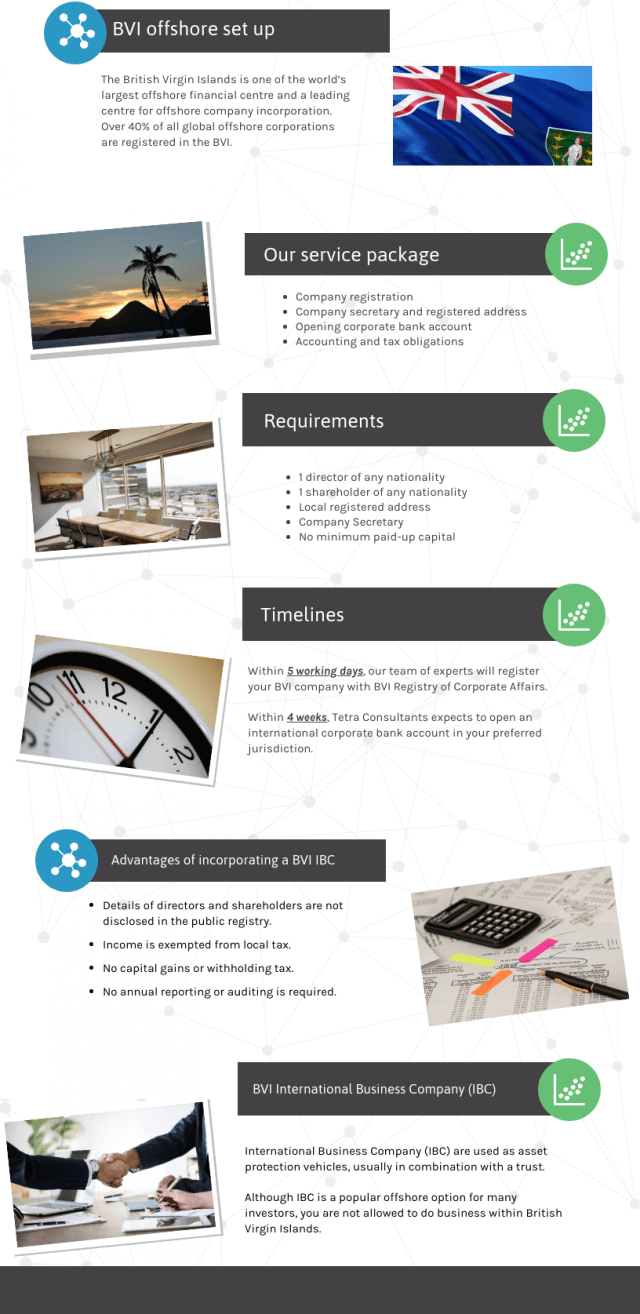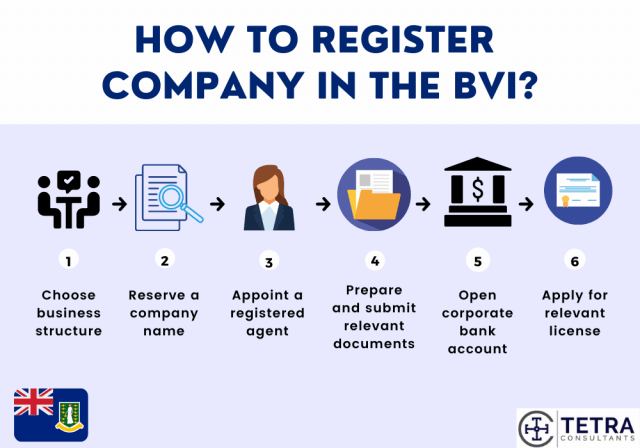Register company in BVI
To register company in BVI is hassle-free with Tetra Consultants’ assistance. The process is straightforward and with Tetra Consultants at the wheel, you will be able to channel your time and energy into other more important aspects of your company.
With our lean-and-mean mentality, you can rely on our team of experts to provide you a seamless experience throughout the whole process to register company in BVI. Our ultimate goal is for your BVI company to be operationally ready within the stipulated time frame.
Our service package includes everything you will require to do business with your BVI company.
- BVI Company registration with British Virgin Islands Financial Services Commission
- Local company secretary and registered address
- Opening local or international corporate bank account
- Financial license application (if required)
- Annual accounting and tax services
Contact us to find out more about how to register company in BVI. Our team of experts will revert within the next 24 hours.
How long does it take to register a BVI company and open corporate bank account?
- Tetra Consultants will register BVI company within 1 week. After receiving due diligence documents of the directors and shareholders, Tetra Consultants will search for the availability of your preferred company name in the Companies Registry. Our team will complete BVI company formation without the need travel.
- On successfully completing the BVI company registration, you can expect to receive the details of your newly registered entity including company number and certificate of incorporation.
- Within 4 weeks upon the successful process to register company in BVI, Tetra Consultants will open a corporate bank account with an international reputable bank. Consequently, you can expect to start operations with the BVI company within 5 weeks upon engaging Tetra Consultants.
- If you are keen to know more about the process, Tetra Consultants has prepared a step by step explanation of all steps required for BVI company incorporation.
Can a foreigner start a business in BVI?
- With its offshore tax exemption policies, guaranteed confidentiality of shareholder information and simple incorporation process and requirements, BVI is a popular and attractive jurisdiction for foreigners to register in.
- BVI’s government offers foreign investors several options on the different types of business entities to choose from when registering a company in BVI. Tetra Consultants will advise you on the steps and requirements for starting business in BVI.
- There is no requirement for a resident director in BVI. This means that a company in BVI can be wholly foreign owned. However, it is to be noted that BVI authorities has introduced amendments under the BVI Business Companies Act, 2022, that have made significant changes regarding the disclosure of director names for the entities registered in BVI. Accordingly, effective from January 1, 2023, the names of directors of BVI companies will be accessible to the registered users of BVI entity search platform that is VIRRGIN.
- Generally, companies in BVI only require one director and one shareholder of any nationality, as well as a company secretary. These can all be the same person or a different one. The roles can also be fulfilled by a corporate entity.
- Further, BVI companies must have a registered address in BVI, also known as a corporate correspondence address, for mail regarding business matters to be sent to your company. A local registered agent must also be appointed. Additionally, as per the new amendments to BVI Business Companies Act, 2022, it is required by the companies registered in BVI to collect, maintain, and keep up-to-date information on the beneficial owner of the company, which must be filed with its registered agent to maintain transparency and compliance with the BVI business environment. However, it is to be noted that amendment does not mention the disclosure of the identities and names of beneficial owner or person with significant control of the BVI entities.
- There is no minimum paid-up share capital requirement for a company in BVI.
- For entities that were set up outside the BVI, you may also need a certificate of incumbency to be submitted to the local authorities. This certificate should include details about the company’s shareholders and directors, share numbers, company formation date and a certificate of good legal standing.
- There are many types of business structures in BVI. When deciding the most suitable entity type, it is important to consider various factors that include but are not limited to availability of personal liability protection, ownership and management flexibility as well as compliance requirements. Each business entity will come with its distinctive features.
- Before the start of the engagement, Tetra Consultants will fully understand your business before recommending the most optimum business entity in BVI. Some considerations we take into account include the type of business activity, tax obligations and nationalities of shareholders and directors. Our consultants will also offer more information on the requirements imposed to set up these entities.
What is a Tax Haven?
- Tax Haven, a category involving many countries such as Dominica, The Republic of Panama, The Bahamas, all share one similar characteristic. Offshore countries with a politically and economically stable economy, these countries offer their international investors and individuals little or even, no tax liability.
- Theoretically, this has made many investors and companies in awe – leaving them to choose to locate in these countries to avoid tax payments.
BVI Tax Haven
- The British Virgin Islands (BVI) are no different. A Tax Haven in itself, tax regulations in the country are fairly simple. With no taxes on offshore accounts and no establishment of tax treaties, it is no doubt that the BVI have been classified as a Tax Haven too.
- Through the enactment of simple taxation rules, the BVI has successfully created what is called a “territorial tax system” that offers many benefits to its companies. The BVI does not impose any capital gains, gifts, sales, value-added, profit, inheritance, or corporation tax. Employees’ salaries are taxed at 10% and 14% for the employer if the annual payroll exceeds US$150,000 or the annual turnover exceeds US$300,000.
- This seemingly attractive tax regime has also lured many investors to register company in BVI and set up foreign-invested enterprises in its home country in order to capitalize on the taxation benefits. With such low tax rates, it is easy to see why the BVI has been classified as a Tax Haven.
- In hindsight, the low tax rate may seem appealing. However, before we proceed with BVI company registration, you will have to scrutinize and understand the limitations as well. Despite recent anti-money laundering laws implemented to improve BVI’s reputation for tax evasion, generally, Tetra Consultants recommends you set up offshore companies in more reputable jurisdictions such as Singapore, Hong Kong, UK or Dubai.
Types of companies in BVI
- Offshore companies are named differently in each country. Widely known as the International Business Company (IBC) which was legalised under the 1984 International Business Companies Act, this popular business entity is also labeled as non-resident companies, exempt companies, special license companies and more. After the introduction of a level zero-tax for all businesses in 2004, the BVI has amended the official name for all new companies to now be simply known as a Business Company.
- Regardless of the name prescribed, all of those entities are independent corporate bodies or otherwise, “judicial persons”, with their tax benefits being prescribed by the actual laws of the registration country. Commonly, the name known and used in popular sources may not be the same as what you may come across in the law.
- To put this into simple terms, despite its official new name “BVI Business Company”, many will still continue to call it the old fashioned way – International Business Company.
- In total, there are seven forms of business entities in the BVI. Spoilt for choice? Choosing the right business entity may be confusing. As such, before the start of the engagement, Tetra Consultants will fully understand our client’s business before recommending the most optimum business entity in the BVI.
- Some considerations we take into account include the type of business activity, tax obligations and nationalities of shareholders and directors. Our consultants will also offer more information on the requirements imposed to set up these entities.
Company Limited by Shares
- A common form of business entity adopted, you can continue to issue shares if you adopt this structure. As per name, members and managers are limited in their personal obligations to the company. When winding up, directors or managers will not be personally liable for the debts and obligations of the company. In essence, the company has a separate legal entity.
- To register a company limited by shares, you will need to declare the form of business entity, the maximum number of shares, the classes of shares and specific details of its rights, limitation and criteria on your company’s Memorandum of Association. Minimally, you will be mandated to have at least one shareholder and one director in your company.
- However, there are no restrictions to who the shareholder or director will be. Thus, you are permitted to appoint the same person as the shareholder and concurrently, the director as well. There are also no nationality requirements for any officeholders when setting up a limited company. Upon the appointment of the first director, the director would have to be the one issuing the first shares in the company. All shareholders holding registered shares in the company will receive a share certificate signed by the director.
Company Limited by Guarantee and Not Authorised to Issue Shares
- Popular among many non-profit organisations, this business type is not stringent in its requirement. Based on the laws, to set up a company limited by guarantee, minimally only one member of the company is to be a guarantee member. A guarantee member is permitted to one vote on any resolution unless it is provided otherwise by the Memorandum or Articles of Association. If it is otherwise provided, you should note that the Memorandum or Articles of Association’s ruling will be prioritized.
- To register a company limited by guarantee, you will need to declare the form of business entity and the essence of its guarantee member’s liabilities on your company’s Memorandum of Association. To gauge the liability of a guarantee member, you can refer to the amount and any other liability expressly provided in the Memorandum and Articles of Association. For any clarity of your liability doubts, you may seek the help of our team of dedicated consultants.
Company Limited by Guarantee and Authorised to Issue Shares
- In essence, this business form represents the marriage between a company limited by shares and a company limited by guarantee and not authorised to issue shares. This unison allows for you to run a company where your guarantee member is concurrently also a shareholder of the company.
- As such, further to the registration of a company limited by guarantee and not authorized to issue shares, the Memorandum or Articles of Association should also make the relevant amendments in declaring that this entity would allow you to still issue shares.
Unlimited Company Authorised to Issue Shares
- A stark contrast to a limited company, an unlimited company when incorporated will have its members or managers personally liable for the debts and obligations incurred by the company. At all times, there must be at least one unlimited member to constitute as an unlimited company.
- Under this business form, the company can issue an unlimited number of shares. However, there are no restrictions on the persona behind this unlimited member. The member can be a shareholder that is still entitled to voting unless otherwise was declared in the Memorandum or Articles of Association.
Unlimited Company Not Authorised to Issue Shares
- Similarly, this unlimited company also has an additional provision whereby members or managers may be personally liable for the debts and obligations incurred by the company. To qualify, there must be at least one unlimited member at all times.
- To distinct this business form from the above, it is to note that this company form is not allowed to issue shares. As such, none of its members can qualify to be a shareholder.
- To register as an unlimited company not authorized to issue shares, there is a need to file the annual return in the approved form of its directors.
Restricted Purpose Company
- A restricted purpose company can only be registered for transactions and activities with limited purposes. These limited purposes extend from managing insolvency-remote issues to off-balance sheet financing work.
- A restricted purpose company can also be formed by a company that is limited by shares. It must also be declared in the Memorandum of Associations as to the business form of the company. Applicants also have to substantiate the purpose of the company when registering.
- Unlike other forms of company, a restricted purpose company is not permitted to amend its memorandum nor any resolution pertaining to the void of its members. It is also important to note that a restricted purpose company has to be registered at the point of incorporation.
Segregated Portfolio Company
- Part of the bigger umbrella of company substitutes, a segregated portfolio company owns separate portfolios. Each individual portfolio has assets and liabilities that can be differentiated from the general assets and liabilities of the company.
- Choosing this business form means that during incorporation, you can be licensed as an insurer or recognized as a professional, private or public fund. While flexibility is greater, the company is not permitted to act as an investment business company or as an insurance manager. Generally, any activity that is regulated under the Banks and Trust Companies Act cannot be performed.
- For the many who chose to adopt this business form, it is commonly done for the purposes of holding assets or to operate multiple businesses. To maintain this business entity, the company has to be limited by shares and received written approval from the Financial Services Commission.
How to register a company in British Virgin Islands?
Step 1: Choosing an optimum business structure
- Prior to BVI company registration, it is essential to choose the correct type of company. Based on your business structure and long-term goals, Tetra Consultants will advise you on the most optimum business entity, paid-up share capital and corporate structure.
- Generally, the most common type of company in BVI is a company limited by shares.
Step 2: Reservation of company name
- Tetra Consultants will search for the availability of the name of your company through the BVI company registration search.
- Once the availability of your company name has been confirmed, Tetra Consultants will reserve your company with the BVI Commercial Registry. The company name can be reserved for up to 90 days.
Step 3: Appointment of registered agent
- While an International Business Company in BVI is not required to appoint a resident director, the company must have a registered agent.
- As such, Tetra Consultants will recommend and appoint a registered agent on your company’s behalf.
Step 4: Preparation and submission of relevant documents
- Before Tetra Consultants can incorporate your company in BVI, you are required to provide a list of required KYC documents. Some of these documents include the names of directors, company’s resolution and identification proof.
- Based on the documents provided, Tetra Consultants will draft and notarize the Memorandum and Articles of Association, business plan and other incorporation documents necessary for a BVI company registration.
- After preparing the required documents, Tetra Consultants will register your company through the BVI companies registration office.
- Upon successful registration of company, Tetra Consultants will courier the BVI company business registration certificate, Memorandum and Articles of Association and other corporate documents to your preferred address.
Step 5: Corporate bank account opening
- Depending on your business structure, the documents required to open a corporate bank account will be slightly different. Tetra Consultants will help in consolidating the documents and opening a corporate bank account with a reputable bank of your choice.
- Opening a local bank account is difficult as there are currently only 3 banks in the BVI, which means that companies that wish to have a bank account in the jurisdiction will have to be physically located on the Islands. Local banks also typically ask for in-person meetings and implement strict KYC measures, making it inconvenient for offshore businesses to successfully open a local account. If travel is required, we will have a representative accompany you to the bank meeting. Otherwise, our team will negotiate with the banks to conduct a conference call instead or to request for a waiver.
- A good alternative is to open a bank account for your business with a reputable international bank. You may leverage on Tetra Consultants’ network and partnerships with many good offshore banks such as in Singapore or Switzerland. Once the bank account has been successfully opened, Tetra Consultants will courier the internet banking token and access codes to your preferred address.
Step 6: Application of relevant license
- Tetra Consultants will check whether there are licences applicable to your company.
- For example, if you wish to undertake investment activities in the BVI, you will have to apply for the relevant licence from the BVI Financial Services Commission. Alternatively, if you are conducting trade activities with locals within the BVI, you will have to apply for a trade licence.
- Tetra Consultants will apply for the relevant license based on the nature and scope of your business activity.
Accounting and tax obligations
- Accounting and tax considerations are important factors when incorporating your company. By outsourcing your BVI accounting and tax obligations to Tetra Consultants, you can be confident that you will be in the best hands. Our team of consultants will ensure that your firm’s financial statements and audits are timely completed if applicable.
- There is no corporate tax in BVI and most BVI companies are not required to file annual returns. Only companies that provide fiduciary services or hold an investment business license are required to prepare and file audited annual returns to the Financial Service Commission.
- Instead of filing an annual return, most companies will have to pay an annual fee to maintain their company’s good standing.
- Under the Economic Substance Act 2019, all companies that engage in relevant activities will also be required to report information about their company such as the annual turnover, expenditure and number of employees employed. The information must be submitted to Beneficial Ownership Secured Search (BOSS) system within six months after the financial period has ended.
- Although there is no requirement for most BVI companies to file accounts, they are expected to prepare accounts and maintain financial records. These records must be kept for at least 5 years from the date of termination of any business relationship or the date of completion of transactions which the records and documents are relevant to.
Why do companies register in British Virgin Islands?
Political
- Supported by a politically stable government, the British Virgin Islands government has been known for providing a beneficial offshore environment for companies. Even, much of its corporate legislations are flexible. This allows companies to enjoy a system that is efficient and will best facilitate their core commercial activities.
- Investing in a tax haven may be risky. When political instability strikes the shores of the British Virgin Islands, the government may decide to embrace exchange controls. This will lead to instability in your investment.
- In 2018, the United Kingdom Parliament voted to force transparency on the British Virgin Islands and 13 other British Overseas Territories. This suggests that transparency within the government may have been undermined. In fact, leaks that came out on headlines later suggested that politicians were among those found to have opened undisclosed offshore accounts.
- The BVI was also blacklisted by the European Union (EU) as a non-cooperative tax jurisdiction in 2017, together with other popular tax havens such as the Cayman Islands and the Bahamas. It was later moved from the blacklist to the grey list due to partial compliance to the standards set by the EU. Eventually, the BVI was removed altogether from the grey list in 2020 after it demonstrated compliance to the new legislations enacted in the Economic Substance Act in 2019.
Economical
- Adopting the US dollar as its official currency, this makes conducting trade an investment activity in the BVI much simpler. The use of US dollar has greatly facilitated the reporting and management of the company’s finances as well as transactions.
- With the low BVI company registration fee and yearly renewal fees, setting up a company in the BVI is relatively inexpensive when contrasted to other jurisdictions. This allows you to channel your incorporation budget into other aspects such as growing the scale of your company through investment in capital.
- Setting up a corporate bank account may be challenging. As the process requires the bank’s compliance team to conduct enhanced due diligence checks, delays may unfortunately result.
Social
- Based on the Pan American Health Organisation, the British Virgin Islands boasts a high literacy rate of 97.7% in 2010.
- Contrasted to its neighbouring countries, the British Virgin Islands have a significantly lower crime rate.
- While the British Virgin Islands may be seemingly known for its offshore economy’s wealth, much of the country’s population live in poor living conditions.
Technological
- The British Virgin Islands has a strong commitment when it comes to supporting technological innovation. By enacting its latest Regulatory Sandbox Framework, the Financial Services Commission aims to assist entrepreneurs to innovate through regulatory and financial technology. The regulations serve to nurture an optimum environment for technological solutions to thrive in the British Virgin Islands.
- In 2019, the governments of the British Virgin Islands has announced its new theme: “BVI Digital Economy – a new driver for development” during the BVI Digital Economy Symposium, signaling the country’s commitment to launching into the cyberspace and building leading technology solutions.
- The government of the British Virgin Islands is set to develop BVI~LIFE, a digital currency, that aims to improve business operations. Through this development, it seeks to reduce transactional fees and increase transaction speed, boosting British Virgin Islands economic standing.
Legal
- The BVI Business Companies Act was enacted in 2004, in replacement of the International Business Companies Act. Although BVI company re-registration under this act can be carried out automatically, it was highly encouraged that BVI companies incorporated before 2004 re-register voluntarily so that they can ensure that the company’s Articles of Association are in full compliance with the Act.
- Under the BVI Business Companies Act, there is greater flexibility in the type of company that can be incorporated. Previously, international companies were not allowed to conduct trade within the BVI. Under the new Act, companies can trade within the BVI for specific type of businesses if they have received approval from the authorities.
- Respecting the privacy of companies, the British Virgin Islands also protects the information of shareholders, directors, equity ratio and income status by law. Accessible by trust management companies only, the law also prohibits them from leaking any of this confidential information such as the register of directors. This greatly protects investors.
- Commercial ventures may land you in disputes at times. Fortunately, the British Virgin Islands Commercial Court is renowned in the offshore world for delivering judgments that are consistent and justified commercially. Decisions are also made swiftly, avoiding delays. If you do end up in a commercial dispute, being incorporated in the strong judicial system of British Virgin Islands should ease off much of your worries.
- Despite its lax taxation rules, the British Virgin Islands has enacted anti-money laundering and anti-terrorist financing legislations that are known to have surpassed international standards.
- In 2013, the International Consortium of Investigative Journalists leaked stories that are accounted by 2.5 million offshore documents. These stories documented how the British Virgin Islands were the prime targeted jurisdiction when it comes to money laundering and tax evasion crimes.
Environmental
- With the initiation of organisations such as Green VI, the British Virgin Islands have made a strong commitment to promoting a greener, cleaner and healthier island.
- Passing the Green Paper on the Proposed Environmental Management and Climate Adaptation Bill signified the government’s commitment to safeguarding the island’s environment. The bill proposed a framework outlining various mechanisms that the island will support and employ in order to raise awareness and resolve environmental issues.
- Fuelled largely by its tourism industry, this could have a potential downside especially since tourists are unlikely to care about conservation efforts.
Alternative to British Virgin Islands offshore company formation
- If you are looking for a quick way to set up a company in the BVI, you can choose to buy BVI company. In other words, you will be purchasing a shelf company. A shelf company is an offshore company that has been registered by the Registered Agent but has not conducted any business activities or incur any debt and obligations. It is considered to be a premade company or a BVI business for sale, that can be bought by business owners interested in setting up a company in the BVI. You can choose to purchase a BVI shelf company with bank account so that you can start operations immediately.
- Although the cost of purchasing a shelf company can be higher than the total costs incurred in incorporating a new company, a shelf company can offer numerous benefits that a newly incorporated company do not have. Firstly, a shelf company helps to save time as you do not have to go through the lengthy process of preparing the required incorporation documents to register for a new company.
- Secondly, it may be useful for your company to have an earlier registration date, so that you can meet certain requirement for some business transactions. For example, it can be easier for shelf companies to obtain loan approvals because they have been incorporated for a longer period of time. Most bank lenders require the company to be incorporated for at least a few years before they will approve loans of a greater amount. Furthermore, potential trading partners tend to prefer working with companies that have been incorporated for a longer period of time because they are perceived to have greater experience and reputability.
- However, purchasing a shelf company would also mean that you forgo the option to choose your company’s structure. In addition, you will have to pay additional fees to the Registrars of Companies in the BVI if you wish to change the name of your shelf company.
Contact us to find out more about BVI company formation. Our team of experts will revert within the next 24 hours.
FAQs
How do I check if a company is registered in BVI?
- To check if a company is registered in BVI, you will have to approach the BVI Commercial Registry. The BVI Commercial Registry will conduct the search and communicate the relevant information to you. Besides being able to check whether a company is registered in the BVI, you can also search for a company’s general information such as the BVI company registration number, the date of registration and the address of its registered office. A small fee will be charged by the Registrar of International Business Companies BVI for the use of this service.
- Alternatively, you can engage the service of the British Virgin Islands Chamber of Commerce. The BVI Chamber of Commerce will perform a BVI company search or a BVI company director search through the Financial Services Commission for a fee of $75 for the first company and $45 for any additional company.
How much does it cost to register a company in BVI?
- The engagement fee for BVI offshore company registration depends on the services you require from Tetra Consultants. Prior to each engagement, our team will fully understand your business needs and inform you of the exact services you require.
- For example, you may not require our bank account opening services if you already have a bank account with some banks.
- Tetra Consultants’ fees include government fees such as business name reservation charges, registration fees and other miscellaneous fees.
Is there a BVI company register?
- Yes, there is a BVI company register that is kept and maintained by the BVI Registry of Corporate Affairs. The BVI company register contains general information about every company registered in the BVI. This includes information about the company’s registration number, date of registration, number of shares the company is authorized to issue, company’s registered agent and the address of the company’s registered agent if applicable.
- The Registry of Corporate Affairs in the BVI is in charge of implementing the BVI Business Companies Act, verifying that all entities conducting trade from the BVI are properly registered, and maintaining the Register of Companies.
How does a BVI Company Work?
- There are several types of BVI company which you can incorporate. This includes a limited company, unlimited company, restricted purpose company and a segregated portfolio company.
- There are two types of limited company, a company limited by shares and a company limited by guarantee. A company limited by shares is the most common choice of company for companies seeking to set up in the BVI and is the equivalent to a private limited corporation in other jurisdictions. This means that shareholders’ liability is only limited to the amount of shares they own if the company becomes insolvent.
- On the other hand, a company limited by guarantee does not have share capital and any liability incurred will fall only on the responsibility of guarantee members. In essence, the liability of the guarantee members will be limited to the amount that they guarantee to contribute if the company becomes insolvent. You can choose whether to set up a company limited by guarantee that is authorised to issue shares or a company limited by guarantee that is not authorised to issue shares.
- To set up an unlimited company, your company is required to have at least 1 unlimited member who will be held liable for any debt and liability incurred by the company. Similarly, you can choose whether to set up an unlimited company that is authorised to issue shares or an unlimited company that is not authorised to issue shares.
- To set up a restricted purposes company, your company must be limited by shares. A restricted purposes company is quite similar to a company limited by shares but can only be registered for companies who undertake trading and investment activities with certain specific purposes such as securitizations or the creation of several investment funds. The specific purpose of the company cannot be amended.
- A segregated portfolio company is a type of restricted purpose company that can create more than one segregated portfolio of assets and liabilities. All the portfolios are legally segregated from each other, and from the company itself.
Do BVI companies have annual returns?
- Most BVI companies do not need to file annual returns. Instead, they are required to pay an annual fee to maintain their company’s good standing. However, there are certain BVI companies which are required to file an annual return. For example, BVI companies that hold an investment business licence will be required to file an annual return to the Financial Services Commission within six months after the financial period has ended.
- Although, most offshore companies in the BVI are not required to file an annual return, they will be required to report information pertaining to their annual turnover, expenditure and number of employees employed if they engage in activities such as banking, shipping, fund management, intellectual property and other relevant activities. This is in accordance with the Economic Substance Act implemented in 2019 to reduce tax evasion and other unfair tax practices. Similarly, the relevant information is to be submitted to the Beneficial Ownership Secured Search (BOSS) system within six months after the financial period has ended.
Do BVI Companies have to prepare accounts?
- Yes, it is expected that BVI companies prepare accounts even though they are not required to submit them to the authorities. According to the BVI Business Companies Act 2004, every company should keep and maintain accounts and financial records which are able to indicate the financial position of the company and account for the company’s transactions. These records must be kept for at least 5 years from the date of termination of any business relationship or the date of completion of transactions which the records and documents are relevant to.
- These records can be kept at the office of the company’s registered agent. In the event that these records are kept elsewhere, the location must be reported to the registered agent.
Do BVI companies need to be audited?
- No, most BVI companies do not need to be audited because they are not required to submit an annual return. However, there are some exceptions. BVI companies that hold an investment business licence will be required to audit and file an annual return to the Financial Services Commission within six months after the financial period has ended. They are also required to prepare audited financial statements according to the international accounting standards. Specifically, since segregated portfolio companies are usually involved in investment activities such as fund management, they will be required to audit their annual reports and financial statements.
What is the best business in BVI?
- The two major industries in the BVI are the tourism sector and the finance sector.
- BVI is famous for its beautiful beaches, yachting activities and scenic parks. Every year, hundreds of thousands of visitors visit the islands to spend their holidays. As such, setting up a business in the tourism sector may be profitable, especially since many cruise ships also stop by at the BVI.
- Another major sector in the BVI is the financial sector. BVI is one of the most attractive location for global companies providing offshore financial services due to the high levels of confidentiality and asset protection offered. There are also no corporate taxes in the BVI. With a well-developed investment banking industry and supporting infrastructure, BVI is an ideal location to open a finance company.













